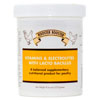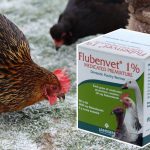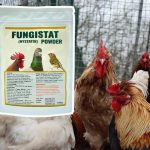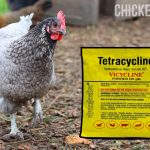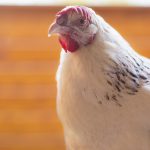Rooster Booster Vitamins & Electrolytes: Usage, Review & Ingredient Analysis
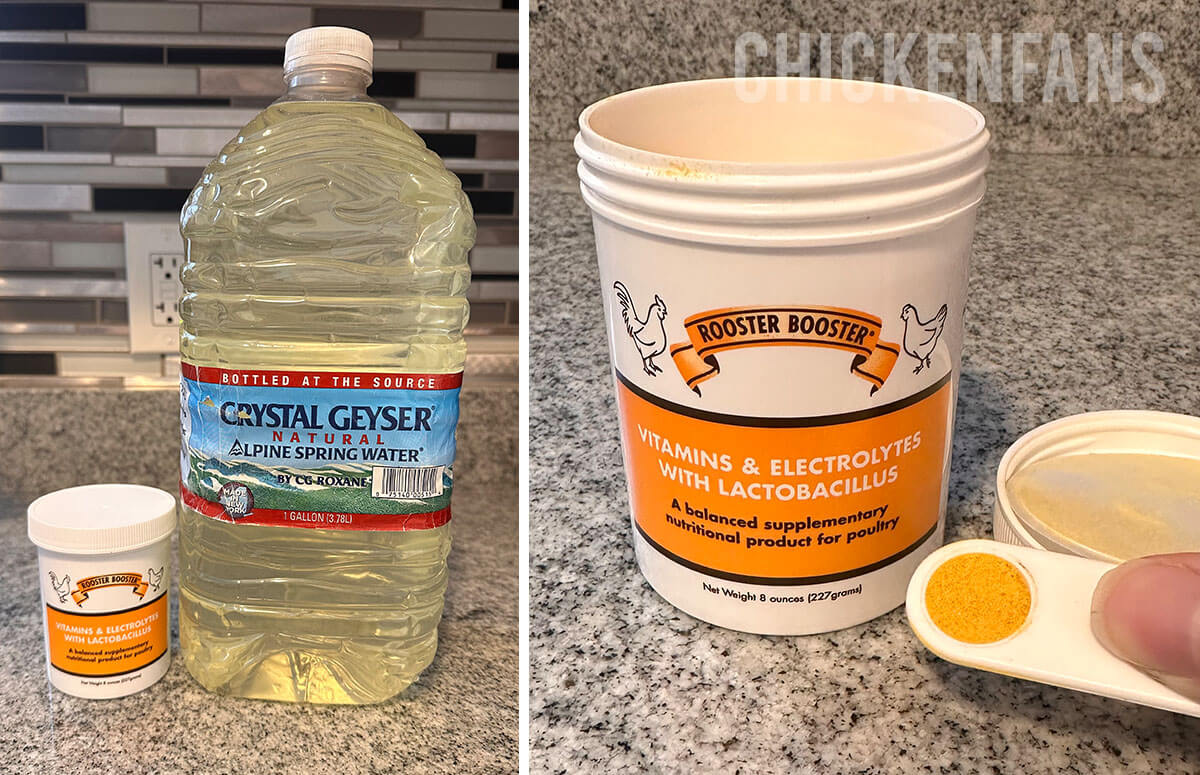
The Rooster Booster Vitamins & Electrolytes with Lactobacillus supplement has it all: vitamins, electrolytes, and probiotics. It is marketed for use with newly hatched chicks and as a health boost for adult chickens. Do they deliver on their promise? What’s in the long list of ingredients? And when do you use it?
We took their product to the test for an in-depth analysis to give you practical advice on how to use it, when to use it, and when to avoid it. We also explain what it can do and what it can’t do.
If you’re short on time, here are the key takeaways:
- Ideal during stress, heat, cold, molting, relocation
- Short term use for hatchlings, chicks & chickens that need support
- Great because it holds Bacillus next to Lactic acid bacteria
- Contains vitamins A, B, D, and E (not C & K)
- Avoid during treatment with Corid (amprolium) for coccidiosis
- Avoid when using amprolium-medicated feed
If you’re just here looking for the supplement, here is the product we are talking about:
- Mix 1/3 teaspoon per gallon of water or 1oz per 16 gallons of water.
Before we take a deep dive into the world of vitamins and live microorganisms, let’s see how it’s used practically to get an idea of what we’re talking about.
How to Give Rooster Booster Vitamins & Electrolytes with Lacto Bacillus
The supplement can be added to the drinking water of the chickens. Mix 1/3 teaspoon per gallon of water or 1oz per 16 gallons of water.
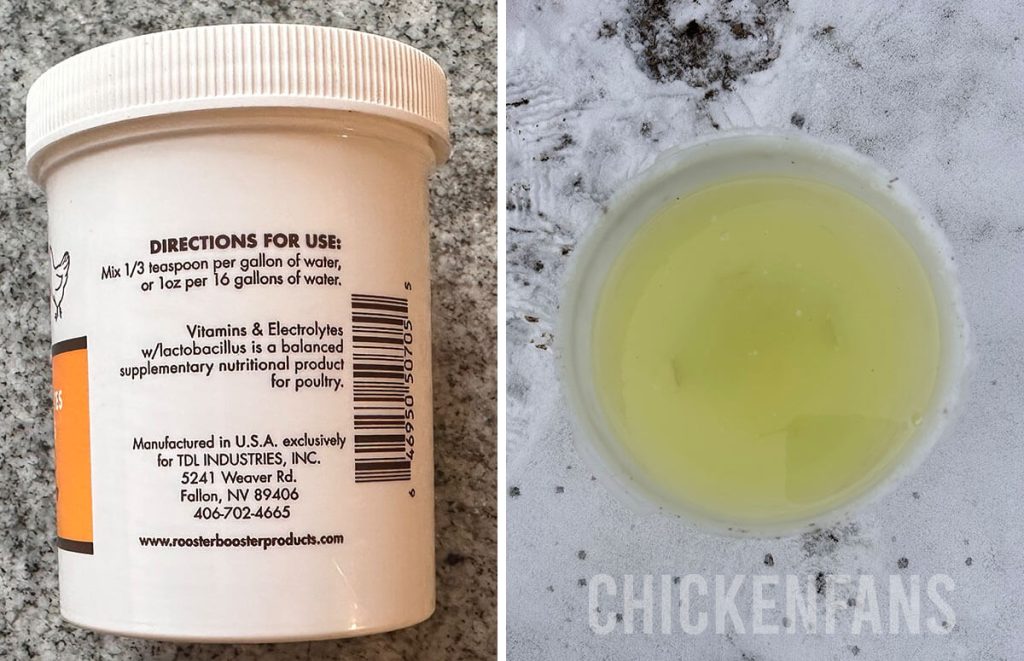
Getting it right can be challenging if you mix up a small batch, but you can use the measuring spoon. For our test, we used two gallons of water for twelve chickens, which allowed us to measure precisely the water-to-supplement ratio per the package instructions.
The product is not a powder but has a granular feeling. Adding the water last allows the free-flowing tap water to mix the supplement as it fills the gallon jug. After mixing the supplement, the water turns yellow, as seen in the photo above.
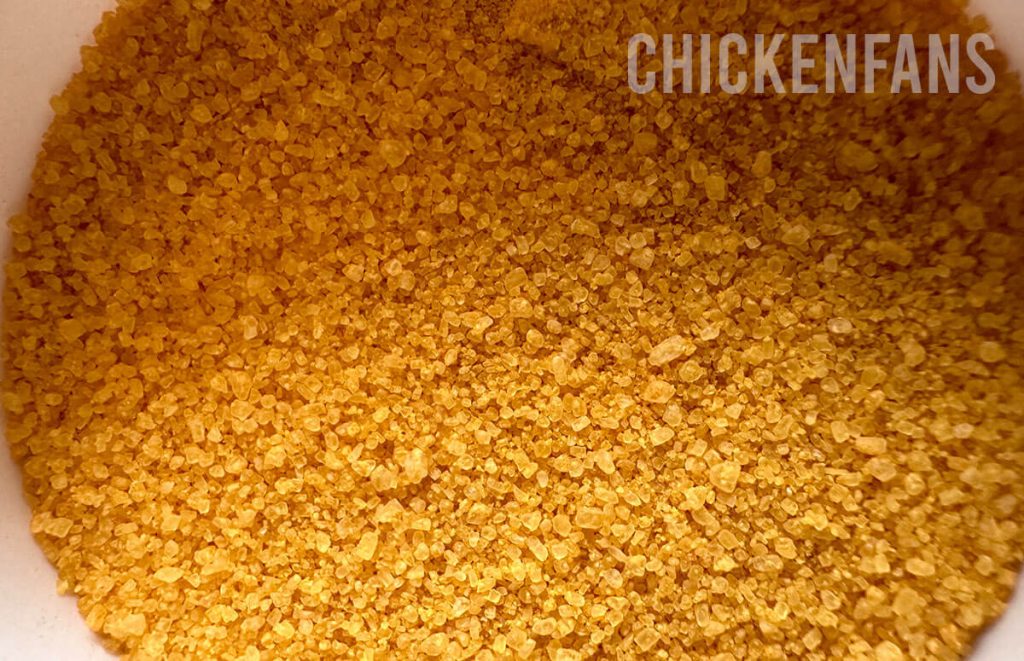
Every morning the flock got a fresh batch of water containing the supplement. They drank more than they typically would with their plain water. You will also likely see your chickens drink more.
That’s not necessarily because they like the taste, but rather due to the high salt levels, which makes them thirsty.
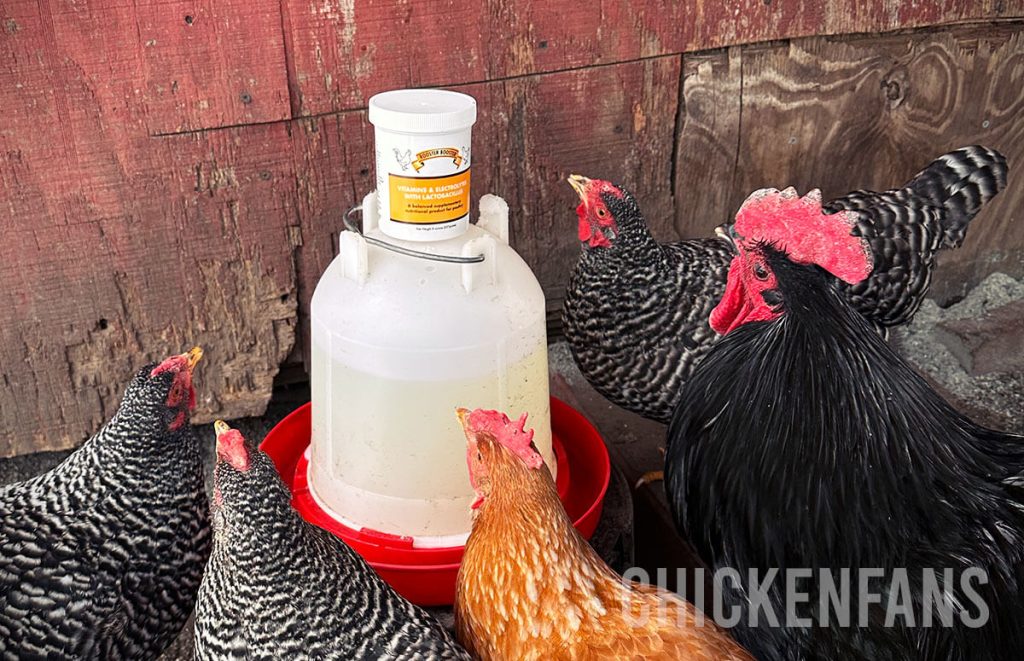
Now let’s have a look at what’s actually in the supplement and what’s it good for.
Vitamins
The Rooster Booster supplement contains vitamins A, B, D, and E.
Since it contains such high fat-soluble vitamins and salt levels, it can only be used for a few days. The concentrations per ounce are up to 10 times higher than the liquid Rooster Booster Poultry Cell.
The following table gives an overview of the vitamin levels, next to the recommended daily vitamin levels in I.U. or mg/kg air-dry feed for egg-laying hens.
| Ingredient | Amount | Daily Value | Type |
|---|---|---|---|
| Vitamin A | 125,000 I.U. | 8,000 – 12,000 I.U. | Vitamin |
| Vitamin D-3 | 46,875 I.U. | 3000 – 4000 I.U. | Vitamin |
| Vitamin E | 160 I.U. | 20 – 30 I.U. | Vitamin |
| Riboflavin (Vitamin B2) | > 32mg | 5 – 7 mg | Vitamin |
| D-Pantothenic Acid (Vitamin B-5) | > 250mg | – | Vitamin |
| Thiamine (Vitamin B1) | > 270mg | 2 – 2.5 mg | Vitamin |
| Pyridoxine HCI (Vitamin B6) | > 270mg | 3.5 – 6 mg | Vitamin |
| Folic Acid (Vitamin B-9) | > 265mg | 1 – 1.5 mg | Vitamin |
The vitamins listed on the label are:
- Vitamin A: Vitamin A is critical in maintaining vision in dimmed light, immunity, and overall growth and development.
- Vitamin B Complex: Vitamin B supports healthy metabolism, energy production, and nervous system function
- Vitamin D: Vitamin D is important for the immune system, calcium absorption, and the formation of bones and eggshells. Chickens can also produce vitamin D in their skin by exposure to direct sunlight.
- Vitamin E: the supplement contains 160 I.U. of vitamin E per ounce. Vitamin E is an antioxidant and helps protect cells from oxidative damage, supporting overall health and immunity.
It’s equally important to realize that Rooster Booster Vitamins & Electrolytes does not contain the following vitamins:
- Vitamin C: ascorbic acid is an essential water-soluble vitamin and antioxidant key to a chicken’s health. Chickens can partially synthesize vitamin C in their livers but still require dietary sources for optimal health. It’s also important for tissue development and the immune system.
- Vitamin K: Vitamin K is key in blood clotting, bone health, and the overall growth and development of chickens.
- Vitamin B12: vitamin B12 is key for maintaining the nervous system and plays an important role in many body functions. Chickens can not synthesize all vitamin B12 by themselves. We discuss the pros and cons of vitamin B12 in depth in another article. Rooster Booster also has a separate vitamin B12 supplement.
The absence of vitamin K is important. If you overdose on the supplement, excessive intake of vitamins A and D can interfere with the body’s ability to absorb and utilize vitamin K, which is essential for blood clotting. Without adequate vitamin K, chickens have an increased risk for bleeding problems, including internal bleeding.
To avoid excesses, always follow the label and avoid overdosing. Other vitamin supplements of Rooster booster, like Poultry Cell, do include vitamin K.
Electrolytes
Although the product has Electrolytes on the label, it only contains salt and potassium. No other electrolytes, like calcium or magnesium, are in the box.
The supplement contains 24-26% of sodium chloride, or NaCl, which is just normal table salt. It also contains 35% potassium.
Salt and potassium are important for several reasons:
- Fluid balance: they help the chicken’s body to balance its internal water levels and acid balance
- Muscle and nerve function: they are essential for muscle contraction and transmission of nerve impulses
- Metabolism: they play a key role in several metabolic body processes
- Immune system: they regulate the pH balance of the blood and bodily fluids, which is important for the immune function
Extra supplementation can help chickens
- in case of diarrhea, which can lead to dehydration and electrolyte imbalances
- in stressful situations like relocation or small housing conditions
- when dealing with heat stress in hot temperatures
- when suffering from diseases that affect the absorption of nutrients
- when they only get grains and vegetables, generally low in sodium
- during high levels of activity
It’s important to note that too much salt and potassium can also be harmful. Excessive intake can lead to dehydration, electrolyte imbalances, and other health problems.
Lactobacillus
Rooster Booster did include not only salts and vitamins but also probiotics.
The supplement contains 1,875 billion lactic acid-producing bacteria per pound. Interestingly it also contains Bacillus, which is not a lactic acid-producing bacterium.
| Bacterium Name | Type | Distinguishing Factor |
| Lactobacillus casei | Lactic acid-producing | tolerates acidic conditions and bile salts |
| Lactobacillus acidophilus | Lactic acid-producing | lowers pH in the gut |
| Enterococcus faecium | Lactic acid-producing | tolerates acidic conditions and bile salts |
| Bacillus subtilis | Other | forms endospores and produces a variety of bioactive compounds |
| Bifidobacterium longum | Lactic acid-producing | breaks down complex carbohydrates |
| Bifidobacterium thermophilum | Lactic acid-producing | grows at high temperatures and tolerates acidic conditions |
Lactic acid-producing bacteria turn sugar into lactic acid. They are the bacteria in fermentation to make food like yogurt and cheese. They can be found in milk, plant, and meat products.
Bacillus microbes don’t produce lactic acid, but they can produce a variety of enzymes and other bioactive compounds. These bacteria are used in soya-based natto fermentation (natto is a Japanese dish made from fermented soybeans).
We only discuss the probiotics in the supplement here, but you can check our article on probiotics in chickens if you’re interested in probiotics and prebiotics.
Lactic acid-producing Bacteria
Lactic acid bacteria are beneficial for chickens for several reasons:
- Gut Health: the bacteria help to maintain a healthy balance of bacteria in the gut
- Nutrient Absorption: the bacteria break down and ferment feed components
- Immune System: the bacteria stimulate the immune system, which helps the chicken to fight off infections
- Antimicrobial Effect: lactic acid bacteria can produce antimicrobial compounds that reduce the growth of harmful bacteria in the gut
Probiotics for chickens are especially useful in the following cases:
- for chicks after hatching
- after a course of antibiotics
- to control diarrhea and digestive issues
- during peak production of laying hens
- to prevent bacterial diseases like E. coli or Salmonella
- during times of stress such as molting, moving, or heat stress
Antibiotics will be phased out sooner rather than later. Probiotics are a safe alternative with no negative side effects. They also don’t leave any residues in the eggs or meat.
Bacillus Subtilis
Bacillus Subtilis is not a lactic acid-producing bacteria, but nowadays, it’s heavily researched as a feed additive for chickens. It has been well established that Bacillus as probiotics enhance body weight gain, feed conversion ratio, and overall production efficiency of chickens.
Bacillus bacteria also improve gut microbiota, histomorphology, and barrier integrity in heat-stressed chickens. It also improves the quantity of healthy Lactobacilli and Bifidobacterium in the intestines.
One study found that adding the probiotic Bacillus subtilis and selenium supplements improved the egg’s feed efficiency, weight, and mass. Adding Bacillus subtilis to the eggs enhanced their albumen height and egg white quality (Haught unit) during the production cycle.
When To Avoid Rooster Booster Vitamins & Electrolytes
You should avoid using this Rooster Booster supplement with a brood of chicks on medicated chick feed or chickens being treated for coccidiosis with Corid (amprolium).
Amprolium is a chemical compound that mimics vitamin B1 (thiamin) and prevents the cocci parasites from synthesizing carbohydrates, so they can’t replicate, starve and die. Since amprolium is so similar to vitamin B1, it inhibits the active transport of real thiamin into the cells.
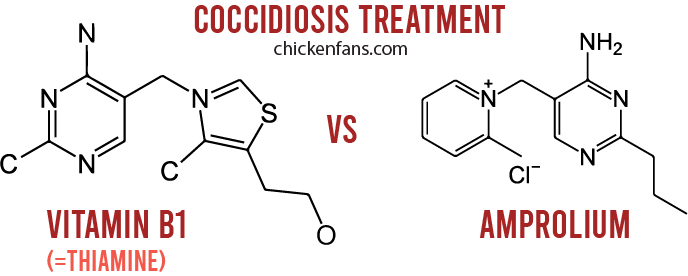
Since this Rooster Booster supplement contains high levels of vitamin B1, it would cancel the thiamin-blocking effect of amprolium and render the medication useless. It would also be counterproductive to helping chicks on medicated feed to build immunity to coccidiosis.
Further Reads
- Rooster Booster Poultry Cell:
- Vitamin B12 for Chickens: an essential vitamin that chickens can’t get from plant-based food
- Probiotics for Chickens: probiotics are natural supplements with live microorganisms found in the chicken’s digestive system. They promote a healthy gut, boost the immune system, egg laying, and prevent viral and bacterial diseases.
- Calcium for Chickens: Calcium is essential for chickens as it’s vital for egg production, controls heart rate and blood clotting, promotes a healthy nervous system, supports growth and development, boosts bone strength, activates digestive enzymes, and regulates the body’s pH.
- Vitamin K for Chickens: vitamin K is a group of 3 chemicals essential for blood clotting, biosynthesis of proteins, bone composition, and embryo development in chickens and poultry.
- Vitamin D for Chickens: Vitamin D is essential for chickens, especially laying hens and chicks. It supports skeleton development and proper immune functioning.
Frequently Asked Questions
Mix 1/3 teaspoon per gallon of water or 1oz per 16 gallons of water. Give for 3 to 5 days.
It’s a supplement with vitamins, electrolytes, and probiotics used for support during stress, heat, cold, molting, and relocation. It’s also great to support young chickens after hatching.
Mix 1/3 U.S. teaspoon per gallon of water or use the measuring spoon according to the instructions on the label.
Yes, the product is for both hens and roosters of all ages. The rooster reference in the product name refers to the company name: Rooster Booster.
Yes, the eggs are safe to eat, and there is no egg withdrawal time for chickens that get Rooster Booster Vitamins & Electrolytes.
The supplement is safe when following the instructions on the label. Excessive use can cause problems due to high doses of certain vitamins. Never use the supplement when you are treating chickens for coccidiosis with a product containing amprolium, like Corid.
Avoid using the supplement during treatment with Corid (amprolium) for coccidiosis or when feeding chicks with amprolium-medicated feed. Vitamin B1 would cancel out the thiamine-blocking effects and render the medication useless.
